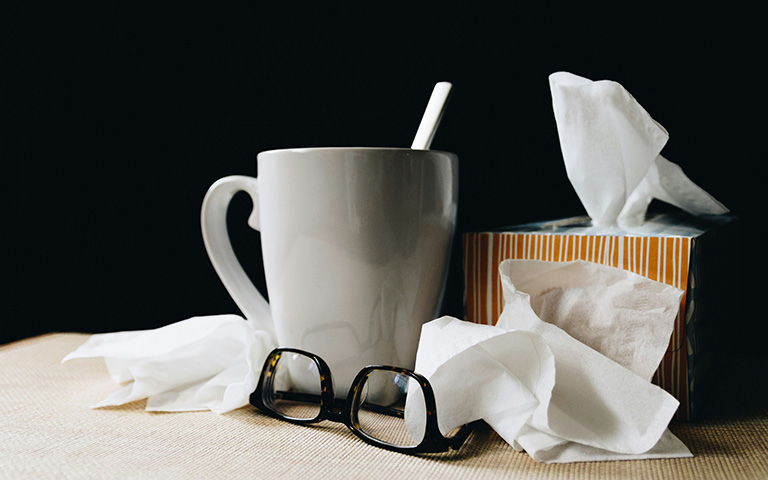Quick Guide to Respiratory Illness Season
 It’s that time of year for tissues, sniffles, sneezes and sore throats. Winter brings
colds, flu and respiratory ailments that spread quickly at school and work. Here is
information you need about seasonal bugs right here at your fingertips:
It’s that time of year for tissues, sniffles, sneezes and sore throats. Winter brings
colds, flu and respiratory ailments that spread quickly at school and work. Here is
information you need about seasonal bugs right here at your fingertips:
Review our Community Health Standards for more information on respiratory illnesses, preventative measures and more. Health Services encourages the campus community to protect themselves and others by obtaining the
flu vaccine and updated COVID-19 vaccine.
How can you care for yourself at home?
- To prevent dehydration, drink plenty of fluids. Choose water and other clear liquids until you feel better. If you have kidney, heart, or liver disease and have to limit fluids, talk with your doctor before you increase the amount of fluids you drink.
- Ask your doctor if you can take an over-the-counter pain medicine, such as acetaminophen (Tylenol), ibuprofen (Advil, Motrin), or naproxen (Aleve). Be safe with medicines. Read and follow all instructions on the label. No one younger than 18 should take aspirin. It has been linked to Reye syndrome, a serious illness. Be careful when taking over-the-counter cold or influenza (flu) medicines and Tylenol at the same time. Many of these medicines have acetaminophen, which is Tylenol. Read the labels to make sure that you are not taking more than the recommended dose. Too much acetaminophen (Tylenol) can be harmful.
- Get plenty of rest.
- Use saline (saltwater) nasal washes to help keep your nasal passages open and wash out mucus and allergens. You can buy saline nose sprays at a grocery store or drugstore. Follow the instructions on the package. Or you can make your own at home. Add 1 teaspoon (5 mL) of non-iodized salt and 1 teaspoon (5 mL) of baking soda to 2 cups (500 mL) of distilled or boiled and cooled water. Fill a squeeze bottle or neti pot with the nasal wash. Then put the tip into your nostril, and lean over the sink. With your mouth open, gently squirt the liquid. Repeat on the other side.
- Use a vaporizer or humidifier to add moisture to your bedroom. Follow the instructions for cleaning the machine.
- Do not smoke or allow others to smoke around you. If you need help quitting, talk to your doctor about stop-smoking programs and medicines. These can increase your chances of quitting for good.
Contact: Interim Director of Health Services Daphne Sharpe
Nov. 20, 2024





